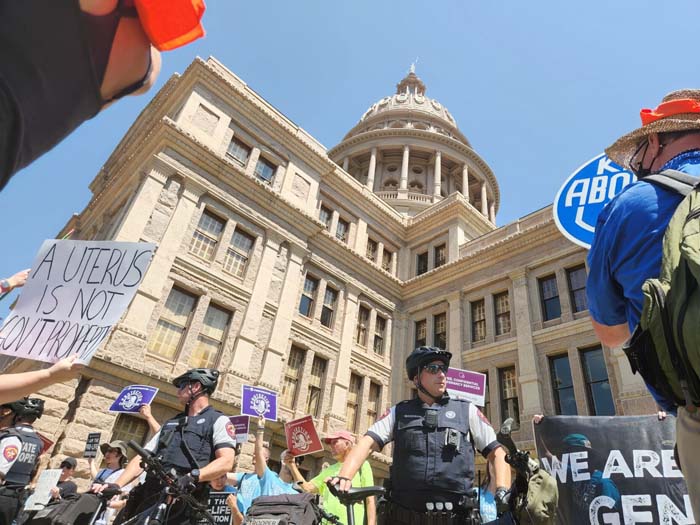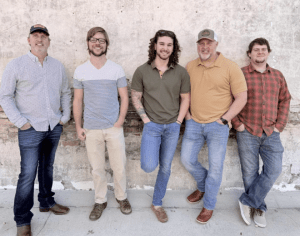Southern states poised to act now that SCOTUS has overturned Roe
Published 10:57 am Friday, June 24, 2022

- State Troopers separated pro-life and pro-choice demonstrators during a "Bans off our bodies" rally Saturday at the Texas Capitol.
ATLANTA — Shortly after the Supreme Court overturned Roe v. Wade Friday, Southern lawmakers forecast plans for their respective states.
Lawmakers have been preparing for a decision in the Mississippi case challenging Roe v. Wade, the 1973 Supreme Court decision protecting a woman’s choice to an abortion.
Trending
The decision to overturn Roe now leaves states to decide respective abortion laws, and many Southern states are expected to either outright ban abortion or impose heavy restrictions.
Georgia
In Georgia, a law seeking to ban abortions once a heartbeat is detected, typically at six weeks, was blocked in court challenges. There are exceptions for rape, incest or medical emergencies. A federal court will now have to lift the block in order for the law to go in effect.
“Across this country, thousands of women are going to die, poverty is going to rise, and millions of lives will be affected,” Democrat Georgia State Sen. Nikki Merritt said. “Now that abortion will be left to the states, it is more important than ever to fight like hell, speak out, demonstrate and elect pro-choice candidates. This is not the end.”
Georgia Republicans, on the other hand, echoed their satisfaction with the SCOTUS decision.
“Since 1973, more or less 50 years, there have been an estimated 65 million babies aborted in the United States – an unbelievable number. We’ve been fighting and praying for the right to life for decades, and today, life won. God is so good,” Republican Georgia U.S. Rep. Jody Hice said.
Trending
In an April interview with CNHI, Republican state Sen. Brian Strickland said he didn’t foresee his colleagues going further to restrict abortion before the six weeks. While he feels the “heartbeat bill” was a reasonable approach for abortion access in Georgia, he said there could be a push from his colleagues for an outright ban following Supreme Court decision.
“I’d be surprised if you saw that change. That seemed to be the place there was a consensus at the time but you know, depends on what happens with the federal decision,” Strickland said. “We could have done something (in 2019) that was even more conservative in a sense, or we could have gone and been less restrictive, but that’s where we were at that time in 2019, where we drew the line and where we came together on that bill.”
Georgia Gov. Brian Kemp said Friday he looks forward to implementing that law that had been held up in the courts.
“I look forward to the (Supreme Court’s decision) impact on the legal proceeding surrounding Georgia’s LIFE Act (HB 481) and hope our law will be fully implemented and ultimately protect countless unborn lives here in the Peach State,” Kemp said.
Sherry Boston, district attorney in metro Atlanta’s DeKalb County, said law enforcement and prosecutors should not be thrust into the health space, regardless of the legislation on the books and will not enforce the law.
“As such, as the elected district attorney with charging discretion for the Stone Mountain Judicial Circuit (DeKalb County), I am vowing not to prosecute individuals pursuant to HB 481. I believe it is a woman’s right to make decisions regarding her own body and medical care, including, but not limited to, obtaining an abortion,” Boston said.
Boston continued, “To be clear, I’m not ‘picking and choosing’ which laws I will and will not enforce based simply upon my own beliefs. I reject the notion that we, as elected prosecutors, should blindly enforce or ‘rubber-stamp’ laws without introspection and question regarding the greater good of the community. As a matter of context, adultery remains a crime in Georgia, but I can’t imagine any of my DA colleagues in the state presenting that charge for indictment. For the record, nor will I.”
Mississippi
Dobbs v. Jackson Women’s Health Organization, the Mississippi case that led to the Supreme Court ruling, was the result of a local abortion clinic’s challenge to the state’s 15-week ban. The state has a trigger law that would ban all abortions except in the case of rape, incest or medical emergencies.
The law would go into effect 10 days after the state attorney general confirms that Roe has been overturned.
“Mississippi has led the nation to overcome one of the greatest injustices in the history of our country,” said Mississippi Gov. Tate Reeves in response to his state’s landmark lawsuit victory. “Our state’s historic case before the United States Supreme Court was the catalyst for overturning Roe v. Wade and has made the nation safer for children than it was a few short hours ago.”
Tate said work must be done to ensure support for mothers and babies during and after pregnancy through policies of compassion.
“Mississippi will work relentlessly to accomplish these goals and will continue to build a culture that supports mothers and children, valuing the inherent dignity of every individual. This is our new pro-life agenda,” he said.
Guttmacher Institute says the South has been chipping away at abortion access and many other states have trigger laws that could go into effect.
Alabama
Alabama has a law that was blocked in court that would ban all abortions, except in the case where the mother’s life is at risk; a federal court would now have to lift the block.
“Today is a watershed moment in the fight for life. The Court’s decision is a landmark in the effort to protect the most vulnerable among us and guarantee their right to life and liberty,” Alabama U.S. Rep. Robert Aderholt stated.
American Civil Liberties Union has spoken against the decision.
“This decision is an unprecedented attack on women’s rights and reproductive freedom. No one should be forced to carry a pregnancy against their will,” ACLU of Alabama stated.
Tennessee
ACLU of Tennessee said forcing pregnancies will have life-altering consequences, including “serious health risks from continued pregnancy and childbirth, making it harder to escape poverty, derailing educational and career plans, perpetuating the trauma of rape and incest, and making it more difficult to leave an abusive partner.”
The ruling, according to ACLU, will harm Black women the most, who research shows have the highest maternal mortality rate in many of the states likely to ban or restrict abortion.
“In Tennessee, Black women are three times more likely to die from pregnancy complications than white women. If abortion is banned nationwide, pregnancy-related deaths are estimated to increase by 21% nationwide, and 33% among Black women,” ACLU of Tennessee stated, citing recent University of Colorado Boulder research.
Tennessee has a trigger law that would criminalize performing or attempting to perform an abortion, except in cases necessary to prevent death or serious and permanent bodily injury to the mother.
Anyone illegally performing an abortion will be charged with a Class C felony. The law will go into effect in 30 days after the Supreme Court’s decision.
“Today’s landmark Supreme Court decision marks the beginning of a hopeful chapter for our country,” Tennessee Gov. Bill Lee said. “After years of heartfelt prayer and thoughtful policy, America has a historic opportunity to support women, children and strong families while reconciling the pain and loss caused by Roe.”
In 30 days, all abortions — including in instances of rape or incest — will become illegal in Texas. The law also makes it a felony crime for doctors to perform the procedure with a sentence of life in prison and a $100,000 fine.






